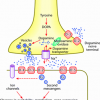I just posted this in my blog, but the point is significant enough that I thought I'd post it here as well. In my post I explain how complexity is a precondition for unlimited lifespans and that those who oppose the movement using the opposite premise (contending that life is shallow enough that extending it is unneeded) are necessarily very simple. Additionally, I explain the restrictions that the premise places on those who use it.
Anyway, I thought it would make a good topic for discussion.
Here's a copy of my post:
The beauty of life lies in its complexity. That statement outlines one of the key incentives for those who wish to achieve indefinite life extension, and for obvious reasons, too. Often a central point in arguments opposing this movement is that the additional time offered is simply unneeded (A stance that I’ve jokingly come to call an “argument from superfluity.”). People taking this position contend that we’re already allotted adequate time to fully pursue our interests, or, at the very least, to pursue them to a reasonable extent. The problem with this argument is that it implies a very narrow set of criteria for what constitutes fulfillment, according to which, essentially, the purpose of life, and therefore the source of fulfillment, is to grow up, reproduce, raise your offspring, assist in raising your offspring’s offspring, and then promptly die. Somewhere in there there’s also a handful of attempts to make trivial advances in the workplace, and perhaps a little room for simple hobbies, but little beyond that. In short, it carries a Darwinian-like simplicity, which is great (After all, it’s why we’re here!), but entirely out of place for a time that offers so much in the way of complexity.
Now at this point most readers are probably thinking that I’m being unduly pejorative in my depiction of common values. Well, that’s not entirely accurate (note that partial concession), and here’s why. To argue that a fulfilling life can be achieved in so little time as the current average lifespan you must, as I said above, live in a grotesquely shallow manner. Why? If you did anything beyond that you’d be tapping a source that couldn’t be fully explored within you’re provided time, and, in consequence, your premise would fall. This is why people who oppose extending the human lifespan on this premise are necessarily simple. If they weren’t, they’d contradict their own premise.
Conversely, this also shows that those who support the movement must thrive on the complexity of life, assuming that they don’t want to live in boredom (or mindlessly) and that their choice is not motivated by the fear of death. *Backing up a second...* The word must is a very sticky word, so it’s worth taking a moment to discuss it further. The statement is restrictive because, given the conditions listed (the three negatives above), complexity is a precondition for indefinite life extension. Logically, then, if for a given person only one thing were needed (exempting biological needs, etc.), then it must fall within this class of complexity, which carries with it yet another implication: The class must be very flexible as to be able to encompass a myriad of subclasses without contradiction. For example, if a person were to claim to live solely for the purpose of love, love would necessarily be considered a subclass within the main class, complexity. Anything else would result in a contradiction. In summary, it’s an interesting point, but it’s more academic than anything else.
All right, so I’ve shown how thriving on complexity is necessary if one wants to live indefinitely, and, equally important, I’ve described the conditions that must be met for this statement to be accurate, but so far I’ve sidestepped discussing the connection between beauty and complexity. Unfortunately, it may be less than thrilling. The connection is more abstract than anything else. You could, however, attempt to make it a little more concrete by using a series of equations. So, here it goes: Assuming that what is necessary for life is also good, then complexity is good, and if you equate good with an abstract form of beauty, then complexity carries with it an abstract form of beauty (This bears a striking resemblance to objectivistic epistemology, don’t you think?). Of course, that’s not exactly what I said now, is it? Those equations don’t preclude the possibility that beauty may be derived from non-complex entities, which clearly contradicts the statement. I could go on to defend it further, but there’s really no point. I’ll concede right now that I chose that statement only for its aesthetic value.
And there it is! The whole premise underlying this blog. In hindsight, perhaps a more appropriate title would have been “Complexity as a Precondition for Life.” It may have also proven to be more provocative, but it lacks that flair that I’m after. There’s something poignant about the word beauty.





















































